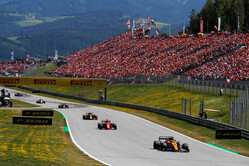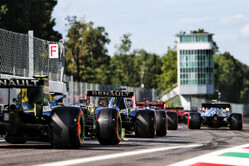


22/05/2020
NEWS STORY
 Like all other activities and sports Formula One faces an uncertain 2020 in the wake of the COVID-19 pandemic as cancellations or postponement of the major races continue.
Like all other activities and sports Formula One faces an uncertain 2020 in the wake of the COVID-19 pandemic as cancellations or postponement of the major races continue.
F1 may be looking at a July start for the 2020 racing season. F1's CEO Chase Carey released a statement confirming the same saying that the organization is increasingly confident of their plans to kick-start the season this summer with some of the initial races to be held behind closed doors.
"We're targeting a start to racing in Europe through July, August and beginning of September, with the first race taking place in Austria on 3-5 July weekend," he wrote. "September, October and November, would see us race in Eurasia, Asia and the Americas, finishing the season in the Gulf in December with Bahrain before the traditional finale in Abu Dhabi, having completed between 15-18 races," he said.
Difficult to kickoff
It is surely a challenging time and it is difficult to predict what hte revised calendar will ultimately look like and its impact on teams and drivers. The opening race of this season whenever that happens, will be the first time that drivers will be in their cars after pre-season testing and teams will find it challenging to get into the groove.
One potential challenge is the fact that as soon as the season starts, it will not stop. There will be no breaks to develop the car. For racers, the work on track will be most critical and more challenging than it has ever been in the history because they will spend an incredible amount of time on track when the season opens.
Where most drivers have been diligent with their routines and fitness regimen, it is just physically difficult to be in the car after staying away for so long from the track. It will have an impact on the drivers when they get back in the cars for the first time. Since there is no testing nor driving an F3 car, it is literally a case of 0 to 225 mph for a majority of the drivers.
Physically, there is no substitute for the actual drive. One can do as much training as one wants at home but you can't replicate the physical movements of jumping into a F1 car with training. This is tough on the human body, to start the racing season after the prolonged break.
 Impact on market value
Impact on market value
F1 is listed on the NASDAQ and is under threat from the pandemic perhaps more than other sports as the races attract an unusually high number of spectators around 20 countries over a span of eight months. F1 has lost 41 percent of its market value since the beginning of 2020. The potential of loss of revenue from the combined hosting fees across the entire season that are paid by host nations could well be over to 602 million U.S dollars.
Not surprisingly, credit rating agency Moody's has changed Formula One's outlook to negative from positive recently to reflect the impact of coronavirus on this global sport.
However, Formula One has strong liquidity and a flexible cost base to survive a severely curtailed 2020 season.
Former champions McLaren became one of the first F1 teams to furlough staff and reduce wages for senior management and drivers. Further furloughing and wage reduction news are expected from other quarters. Formula One says it will furlough half of its staff until the end of May and senior executives have to take pay cuts. Employees impacted due to the financial crisis could apply for a cash loan to survive the difficult season.
Adowngrade of Moody's rating is possible if further disruption occurs to the race calendar and causes concerns about liquidity.
 Silver lining
Silver lining
There is one silver lining amid all this gloom. The 2020 chassis will be carried over to 2021 with a freeze on development of further components after 2020. The official statement says that "The introduction and implementation of the [new] financial regulations will go ahead as planned in 2021, and discussions remain ongoing between the FIA, Formula 1 and all teams regarding further ways to make significant cost savings."
This will provide significant operational savings considering the financial disruptions caused by Covid-19.
2020 will go down in history as one of the most challenging years for all sports including motorsports. Whether races will eventually take place or the shutdown is extended depends on state of affairs in summer.